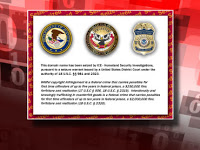Eric Blair
Activist Post
Who needs SOPA (Stop Online Piracy Act) or the international ACTA (Anti-Counterfeiting Trade Agreement) when companies can have websites or YouTube channels removed simply by claiming their content has been infringed?
That is exactly what happened to the hip hop blog Dajaz1.com when the US government seized and censored it for over a year at the behest of the Recording Industry Association of America (RIAA). RIAA claimed, while providing no evidence, that Dajaz1 was infringing on their copyrights and demanded they be shut down.
The government obliged the request before receiving any proof of the infringement. As it turns out, the RIAA couldn’t provide any evidence and the government was forced to return the website with not so much as even an apology. Fortunately, Dajaz1 had their property returned to them, but not before they lost a year of revenue plus the aggravation involved in battling false claims.
This case illustrated that the burden of proof was not needed, nor was due process, to censor and seize properties that are accused of copyright crimes.
In the past, the Department of Homeland Security has committed mass seizures of websites and domains suspected of copyright piracy, and even shut down sites for merely linking to to copyrighted material confirming that the government and judges will do the bidding for large corporations with or without the authority to do so.
Incidentally, using this draconian tactic appears to be the only way that “authorities” can seize websites accused of copyright violations. Every single case where copyright trolls like Righthaven have attempted to use proper court channels (i.e. due process), the lawsuits were either dismissed or ruled in favor “fair use rights.“
Because not one of these cases has proven to be genuine copyright infringement, one would think that they should be treated as “innocent until proven guilty” going forward. However, these preemptive seizures seem to be on the increase even without sweeping authority given in bills like SOPA, or more recently CISPA.
What’s worse, content hosting sites like YouTube have recently begun implementing automated copyright sensors which act to shut down channels of those who were flagged in the system. And these actions have not even been prompted by legislation or corporate requests.
This week, YouTube restricted the channels of one of the most-viewed publishers on their platform because of an automated copyright claim by a third-party marketing company. Radio news host Alex Jones, whose primary YouTube channel has over 200 million views, and affiliate channels combine for nearly a half-a-billion views, was put on notice by Google-owned YouTube.
What was Jones’ copyright crime? He aired his radio interviews with Joe Rogan who is under contract with a web marketing company called Bent Pixels. Bent Pixels claims sole copyright ownership of Rogan’s voice and image.
Paul Joseph Watson, who works for Alex Jones, writes:
Although Bent Pixels had previously used its own software to place ads on You Tube videos that contain exclusive Rogan content, You Tube began using its own automated software to determine which videos contained the image or voice of Joe Rogan, and then threatened legitimate content owners with community violations if the clips were not removed.
Not only our videos of Joe Rogan’s appearances on the Alex Jones Show but other Joe Rogan videos across You Tube were deleted on this pretext and channels were suspended.
This software has been applied across the You Tube platform, which is why hundreds of thousands of videos are now being deleted even though they clearly represent fair use or are even exclusive content which doesn’t even pertain to fair use.
 YouTube appears to be prosecuting an entirely new form of copyright infringement with no regard for fair use rights. Watson refers to this disturbing new frontier of censorship as ‘Copyrighting People’.
YouTube appears to be prosecuting an entirely new form of copyright infringement with no regard for fair use rights. Watson refers to this disturbing new frontier of censorship as ‘Copyrighting People’.
Obviously, it’s not copyright infringement when a personality goes on an independent radio show who then publishes their own material online. Any judge would laugh this supposed violation out of court.
The oft-used metaphor for identifying copyright infringement online is “It’s like porn; you know it when you see it.”
But, it’s clear that an automated bot doesn’t have the judgement needed to prosecute potential crimes especially in light of fair use rights. Nor does a police agency like DHS have the judgement or authority in such cases.
It still remains unclear why online copyright laws need to be strengthened in the first place. There are already paths for content creators to pursue if they feel violated. They can simply request that a site remove their content or take them to court. Of course, that would require that they provide evidence that is beyond fair use rights.
At best any sweeping legislation to further police copyrights is akin to using a sledgehammer when only a scalpel is needed. Yet, it’s more likely that the sledgehammer is intended to be a tool of mass censorship to smash competition who threaten mega-corporations in the only genuine free market left – the Internet.
Read other articles by Eric Blair here.



Be the first to comment on "Copyright Claims Shut Down Websites With No Proof or Due Process"